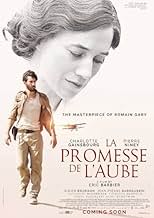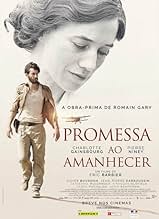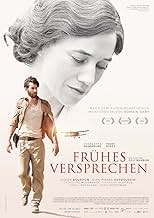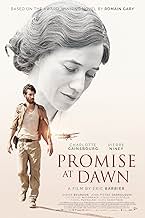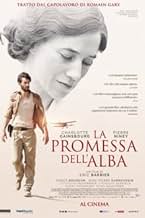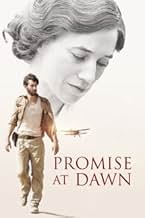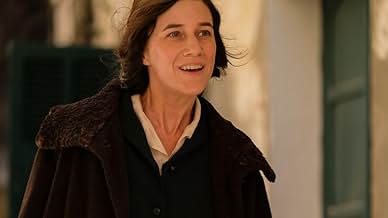PUNTUACIÓN EN IMDb
7,1/10
4,1 mil
TU PUNTUACIÓN
Añade un argumento en tu idiomaA man recounts his life, from his childhood through his experiences in World War II, and the story of his self-sacrificing mother, who raised him alone.A man recounts his life, from his childhood through his experiences in World War II, and the story of his self-sacrificing mother, who raised him alone.A man recounts his life, from his childhood through his experiences in World War II, and the story of his self-sacrificing mother, who raised him alone.
- Dirección
- Guión
- Reparto principal
- Premios
- 1 premio y 7 nominaciones en total
Reseñas destacadas
Very good dramatic comedy about the impressive life of Jewish writer and military pilot Romain Gary (Kacew), his relashionship with his crazy, controlling and abusive mother (he loved her, but I did not see a so bad mother since Brian de Palma's "Carrie") and anti-Semitism during and before World War II. Quite dark humor for narrating a glorious but tragic life.
Based on novelist Romain Gary's biography,this is the second version of the writer's youth .In her husband Jules Dassin's 1970 movie, Melina Mercouri hammed it up,but did convince as this character of a Jewish mom ,and it was the main asset of this earlier work.That director ,in his last part of his career,was succumbing to the vices of European cinema of the era: the slow motion sequences ,which were very trendy then are almost unbearable today.Romain was played by no less than three different actors.
The same goes for the remake :a boy ,a teenager and a young man (Niney,thus,only appears in the second half);.Charlotte Gainsbourg reprises La Mère-Couri 's role and compares favorably with her performance ,less histrionic,but always omnipresent -her arrival at the base is worth the price of admission-,ambitious ,demanding ,almost in love with her son (one never sees her have an affair with a single man ,though some of them (the painter, portrayed by the always reliable Darroussin)woo her .
Longer than the first version (101 min) ,this one (125 min) sometimes drags on and seems a little patchy and desultory but it's inherent in any biography ;sex scenes are more explicit (the initiation scene with the unexpected mom because of the coach incident is featured in both movies) .
War scenes are much more developed than in the first adaptation ;it sometimes verges on ridicule : the aviator ,suffering from typhoid,crosses the hospital stark naked .
Two small details : two soldiers were actually denied their promotion,Romain was not the only one ,but it 's less storylike on the paper,let alone on the screen. The 250 letters mom supposedly wrote are pure fiction; when he was in Africa, a telegram was sent to Romain who knew his dear one was dead when he came back to France.
The prologue in Mexico ,a bit gaudy , is a bit derivative:how many biographies were filmed as flashbacks?
All in all, you should see this remake ,but mainly for miss Gainsbourg ,in one of her best parts.
NB: When the first version was released,Gary was still alive ;hence the necessity to treat his material more gingerly.
The same goes for the remake :a boy ,a teenager and a young man (Niney,thus,only appears in the second half);.Charlotte Gainsbourg reprises La Mère-Couri 's role and compares favorably with her performance ,less histrionic,but always omnipresent -her arrival at the base is worth the price of admission-,ambitious ,demanding ,almost in love with her son (one never sees her have an affair with a single man ,though some of them (the painter, portrayed by the always reliable Darroussin)woo her .
Longer than the first version (101 min) ,this one (125 min) sometimes drags on and seems a little patchy and desultory but it's inherent in any biography ;sex scenes are more explicit (the initiation scene with the unexpected mom because of the coach incident is featured in both movies) .
War scenes are much more developed than in the first adaptation ;it sometimes verges on ridicule : the aviator ,suffering from typhoid,crosses the hospital stark naked .
Two small details : two soldiers were actually denied their promotion,Romain was not the only one ,but it 's less storylike on the paper,let alone on the screen. The 250 letters mom supposedly wrote are pure fiction; when he was in Africa, a telegram was sent to Romain who knew his dear one was dead when he came back to France.
The prologue in Mexico ,a bit gaudy , is a bit derivative:how many biographies were filmed as flashbacks?
All in all, you should see this remake ,but mainly for miss Gainsbourg ,in one of her best parts.
NB: When the first version was released,Gary was still alive ;hence the necessity to treat his material more gingerly.
I confess that I had great expectations and some emotions before seeing 'La promesse de l'aube'. Romain Gary was together with Boris Vian, the favorite French writer of my adolescence, and 'La promesse de l'aube' was one of my beloved books paired with Vian's 'L'ecume des jours'. The new version of the film (its second adaptation to screen) directed by Eric Barbier fully met my expectations.
The book and the film tell about two love stories. The first of these is the love of a mother for her son, an unlimited love, a love that is remembered by the writer over the years, a love that determined the course of his life. In most of the world's literature and languages for such a mother the common expression is 'Jewish mother', only in Hebrew such a mother is called a 'Polish mother'! Both fit here. The son's answer is, of course, the book that Romain Gary wrote decades later, the book that inspired the film. I can say without hesitation that this book is unique in the literature in its description of the relationship between a mother and her son. The second love story is for France. The book's heroine passionately loves her country of adoption, the country that saved her life, sheltered her, gave her the dignity. Nina Kacew educates her son to love France, returning the love that seems to have been offered to them unconditionally. However, none of the two love stories are happy to the end. Romain Gary's life will be cut short by suicide, and it is impossible to establish which were the sources of despair and disappointment that led to this, but it can not be ruled out that the partial failure of the life plan predestined by his mother had a role. The love of the Jews sheltered by France for their country and their readiness to return their gratitude with all sacrifices, including life, was hardly put to the test of history, from the Dreyfuss case to the racial persecutions and deportations during the Second World War. The book and the film end up in an optimistic note, but readers and viewers know this is not the whole story.
'La promesse de l'aube' is a captivating and exciting movie. Many viewers, probably, like me, know the intrigue and the characters, yet the precision of the details, together with the sensitivity and the passion of the actors, create a moving story that cannot leave the spectators indifferent. Charlotte Gainsbourg is fascinating as a woman living through several ages, struggling to survive and succeed, radiating the fierce love for her son, conveying her passion for life and her love for the adoptive country. All the three actors who represent the writer at different ages are excellently chosen and play very well, with a special mention for Pierre Niney who creates again a superb role and consolidates in my eyes his position as one of the best French actors of the moment. Watching the film not only did not disappoint me at any point in comparison with the emotions related to reading 'La promesse de l'aube' many decades ago, but added new dimensions to the intellectual experience around this exceptional book.
The book and the film tell about two love stories. The first of these is the love of a mother for her son, an unlimited love, a love that is remembered by the writer over the years, a love that determined the course of his life. In most of the world's literature and languages for such a mother the common expression is 'Jewish mother', only in Hebrew such a mother is called a 'Polish mother'! Both fit here. The son's answer is, of course, the book that Romain Gary wrote decades later, the book that inspired the film. I can say without hesitation that this book is unique in the literature in its description of the relationship between a mother and her son. The second love story is for France. The book's heroine passionately loves her country of adoption, the country that saved her life, sheltered her, gave her the dignity. Nina Kacew educates her son to love France, returning the love that seems to have been offered to them unconditionally. However, none of the two love stories are happy to the end. Romain Gary's life will be cut short by suicide, and it is impossible to establish which were the sources of despair and disappointment that led to this, but it can not be ruled out that the partial failure of the life plan predestined by his mother had a role. The love of the Jews sheltered by France for their country and their readiness to return their gratitude with all sacrifices, including life, was hardly put to the test of history, from the Dreyfuss case to the racial persecutions and deportations during the Second World War. The book and the film end up in an optimistic note, but readers and viewers know this is not the whole story.
'La promesse de l'aube' is a captivating and exciting movie. Many viewers, probably, like me, know the intrigue and the characters, yet the precision of the details, together with the sensitivity and the passion of the actors, create a moving story that cannot leave the spectators indifferent. Charlotte Gainsbourg is fascinating as a woman living through several ages, struggling to survive and succeed, radiating the fierce love for her son, conveying her passion for life and her love for the adoptive country. All the three actors who represent the writer at different ages are excellently chosen and play very well, with a special mention for Pierre Niney who creates again a superb role and consolidates in my eyes his position as one of the best French actors of the moment. Watching the film not only did not disappoint me at any point in comparison with the emotions related to reading 'La promesse de l'aube' many decades ago, but added new dimensions to the intellectual experience around this exceptional book.
Absolutely DIVINAL! Majestic interpretations and how history grabs you to the screen is remarkable
A great story, well told and represented. A good movie starts in a great script. French cinema continues to bring us the finest art.
¿Sabías que...?
- CuriosidadesTo prepare the character of Nina, actress Charlotte Gainsbourg admits to have been inspired by her paternal grandmother, also of Russian origin.
- Citas
Roman Kacew, dit Romain Gary: I made the promise to straighten the world and lay it at his feet
- ConexionesFeatured in ACS France (2018)
- Banda sonoraThe Twins
Composed by Max Richter
Selecciones populares
Inicia sesión para calificar y añadir a tu lista para recibir recomendaciones personalizadas
- How long is Promise at Dawn?Con tecnología de Alexa
Detalles
- Fecha de lanzamiento
- Países de origen
- Sitios oficiales
- Idiomas
- Títulos en diferentes países
- Promesa a l'alba
- Localizaciones del rodaje
- Bordighera, Imperia, Liguria, Italia(Interior and exterior scenes)
- Empresas productoras
- Ver más compañías en los créditos en IMDbPro
Taquilla
- Recaudación en todo el mundo
- 9.242.157 US$
- Duración2 horas 11 minutos
- Color
- Relación de aspecto
- 2.39 : 1
Contribuir a esta página
Sugerir un cambio o añadir el contenido que falta

Principal laguna de datos
What is the Spanish language plot outline for Promesa al amanecer (2017)?
Responde

